PRINCE2 Agile course Plymouth
PRINCE2 Agile training in Plymouth teaches you how to integrate modern agile tools and techniques with the reliable governance of the PRINCE2 method.
An agile approach is an ideal way to improve collaboration and communication in a dynamic development team. PRINCE2 and agile are the perfect match, providing the benefits of both traditional project management and iterative development.
PRINCE2 Agile Practitioner certification Plymouth
PRINCE2 Agile Foundation & Practitioner online courses
Learn through either a self-paced online course or virtual classroom. Earn both PRINCE2 Agile Foundation and Practitioner qualifications with this combined PRINCE2 Agile course. A PRINCE2 Agile certification demonstrates your ability to apply agile best practices to any project, regardless of scope or complexity. Courses are based on the latest edition of the PRINCE2 Agile handbook. PRINCE2 Agile Foundation exam and PRINCE2 Agile Practitioner exam included.
- Earn both entry-level and intermediate PRINCE2 qualifications at reduced cost
- Our expert agile trainers will teach you an applicable understanding of key agile concepts and how these blend seamlessly into the PRINCE2 methodology.
Accreditation: AXELOS
Pre-requisites: None
Format: Online self-study course or classroom course
PRINCE2 Agile Practitioner self-paced courses
Learn to adapt your project management approach, incorporate contemporary agile tools, and improve productivity. Earning your PRINCE2 Agile Practitioner qualification shows employers that you can deliver value to stakeholders early while mitigating risk, making you a highly desirable candidate for any agile project management role.
This course is based on the latest edition of the PRINCE2 Agile handbook. PRINCE2 Agile Practitioner exam included.
- The PRINCE2 Agile Practitioner syllabus helps you adapt your agile management approach to suit projects of varying size and complexity
- Our self-study courses are designed with the aid of agile experts so you can pass your Practitioner exam with ease!
Accreditation: AXELOS
Pre-requisites: PRINCE2 Foundation or PRINCE2 Agile Foundation
Format: Online self-study course
PRINCE2 Agile Practitioner classroom course in Plymouth
Study advanced PRINCE2 Agile concepts with the help of a professional PRINCE2 Agile trainer. Our virtual classrooms deliver all the benefits of in-person training without the hassle of travel or accommodation. PRINCE2 Agile Practitioner qualifications are a must-have for PRINCE2 project managers who want to improve their marketability as project managers. This course in Plymouth is based on the latest edition of the PRINCE2 Agile handbook. Agile Practitioner exam included.
- PRINCE2 Agile Practitioner trainer teaches you how to apply lessons learned in the Foundation course in a practical and flexible way
- This qualification is a great way for you to enhance your CV and advance your career as a project manager.
Accreditation: AXELOS
Pre-requisites: PRINCE2 Foundation or PRINCE2 Agile Foundation
Format: Classroom course
PRINCE2 Agile Foundation certification Plymouth
PRINCE2 Agile Foundation online course
PRINCE2 Agile Foundation training serves as an introduction to both PRINCE2 and Agile. You’ll learn an understanding of practical agile concepts and techniques, including Scrum, Kanban, Lean Start-up, and Cynefin. PRINCE2 Agile is suitable for anyone who supports agile projects or agile project managers within an agile project environment. This course is based on the latest edition of the PRINCE2 Agile manual. PRINCE2 Agile Foundation exam included.
- PRINCE2 Agile focus on the project and the outcome, ensuring fast delivery while reducing risk
- Our PRINCE2 Agile Foundation online courses are a great e-learning alternative for dispersed teams and students outside the UK.
Accreditation: AXELOS
Pre-requisites: None
Format: Online self-study course
PRINCE2 Agile Foundation classroom course in Plymouth
Earn your PRINCE2 Agile Foundation qualification with training provided in Plymouth by our own professional PRINCE2 Agile trainers. PRINCE2 Agile virtual training is a great way to train staff or study towards an intermediate PRINCE2 Agile Practitioner certification.
This course in Plymouth is based on the latest edition of the PRINCE2 Agile guide. PRINCE2 Agile Foundation exam included.
- If you already use PRINCE2, PRINCE2 Agile is a good way to start introducing agile techniques without the need for wide-sweeping change initiatives
- Virtual training is a cost-effective distance learning alternative for those who enjoy learning in a social environment.
Accreditation: AXELOS
Pre-requisites: None
Format: Classroom course
More information about Plymouth
Training in Plymouth
Plymouth a port city in South West England on the south coast of Devon. It is south-west of Exeter and bordered by Cornwall to the west and south-west. If you would like to take a classroom course at our Plymouth training venue, you can find us at Salt Quay House, 6NE Quay, Plymouth PL4 0HP. Wer’re just a 17 minute walk from Plymouth railway station in Sutton harbour.

Travel to and from Plymouth
Road and bus
The A38 dual-carriageway across the north of the city and connects Plymouth to the M5 motorway. If heading west it connects Devon with Cornwall via the Tamar Bridge. Bus services are mainly provided smaller local operators. Long distance bus services terminate at Plymouth coach station.
The A38 dual-carriageway across the north of the city and connects Plymouth to the M5 motorway. If heading west it connects Devon with Cornwall via the Tamar Bridge. Bus services are mainly provided smaller local operators. Long distance bus services terminate at Plymouth coach station.

Ferry
A regular international ferry service operates from Millbay taking cars and foot passengers directly to France and Spain on the three ferries, MV Armorique, MV Bretagne and MV Pont-Aven. The Cremyll Ferry takes passengers between Stonehouse and the Cornish hamlet of Cremyll. There is also a ferry from the Mayflower Steps to Mount Batten.
A regular international ferry service operates from Millbay taking cars and foot passengers directly to France and Spain on the three ferries, MV Armorique, MV Bretagne and MV Pont-Aven. The Cremyll Ferry takes passengers between Stonehouse and the Cornish hamlet of Cremyll. There is also a ferry from the Mayflower Steps to Mount Batten.
Air travel
Plymouth City Airport used to operate flights across the United Kingdom and Ireland but was closed in favour of directing out-bound flights through Exeter International Airport and Newquay Cornwall Airport.
Plymouth City Airport used to operate flights across the United Kingdom and Ireland but was closed in favour of directing out-bound flights through Exeter International Airport and Newquay Cornwall Airport.
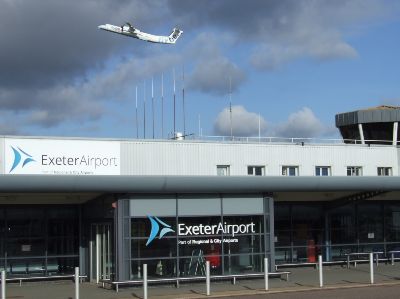
Rail
Plymouth railway station is served by trains on the CrossCountry network while smaller stations in the suburban area of the city centre are served by local services on the Cornish Main Line.
Plymouth railway station is served by trains on the CrossCountry network while smaller stations in the suburban area of the city centre are served by local services on the Cornish Main Line.
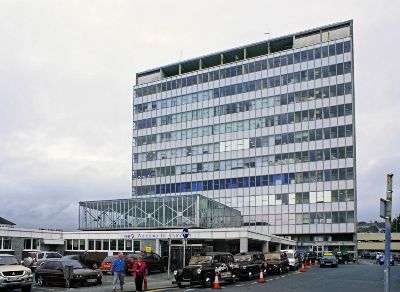
Cycle
Plymouth is at the southern end of the Devon Coast to Coast Cycle Route also known as National Cycle Route 27 The route runs mostly traffic-free on off-road sections between Ilfracombe and Plymouth using former railway lines and some stretches of public roads.
Plymouth is at the southern end of the Devon Coast to Coast Cycle Route also known as National Cycle Route 27 The route runs mostly traffic-free on off-road sections between Ilfracombe and Plymouth using former railway lines and some stretches of public roads.
Things to do in Plymouth
Sightseeing
After the English Civil War the Royal Citadel was erected in Plymouth Hoe, to defend the port from naval attacks, and to train the armed forces. Tours are available in the summer. West is Smeaton’s Tower, a lighthouse that was constructed in 1759 before being dismantled and partially reassembled on Plymouth Hoe. Plymouth has 20 war memorials including Plymouth Naval Memorial, and the Armada Memorial, to commemorate the defeat of the Spanish Armada. The early settlement of Plymouth, and area of the city now referred to as the Barbican has 100 listed buildings.
After the English Civil War the Royal Citadel was erected in Plymouth Hoe, to defend the port from naval attacks, and to train the armed forces. Tours are available in the summer. West is Smeaton’s Tower, a lighthouse that was constructed in 1759 before being dismantled and partially reassembled on Plymouth Hoe. Plymouth has 20 war memorials including Plymouth Naval Memorial, and the Armada Memorial, to commemorate the defeat of the Spanish Armada. The early settlement of Plymouth, and area of the city now referred to as the Barbican has 100 listed buildings.
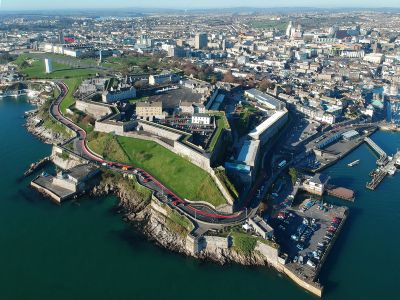
Near Sutton Poole is the National Marine Aquarium which displays 400 marine species and includes Britain’s deepest aquarium tank.
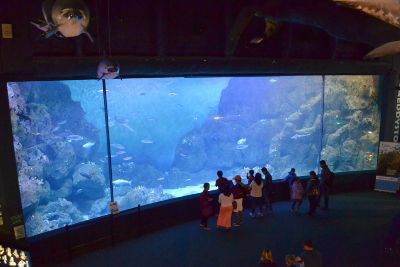
Sports
Plymouth is home to Plymouth Argyle F.C., who play at Home Park, located in Central Park. The city also has three Non-League football clubs; Plymouth Parkway, Elburton Villa and Plymstock United.
Plymouth is home to Plymouth Argyle F.C., who play at Home Park, located in Central Park. The city also has three Non-League football clubs; Plymouth Parkway, Elburton Villa and Plymstock United.

Plymouth Albion Rugby Football Club play at the Brickfields. The Plymouth City Patriots play at the highest level of British baseball and is based in the Plymouth Pavilions entertainment arena.
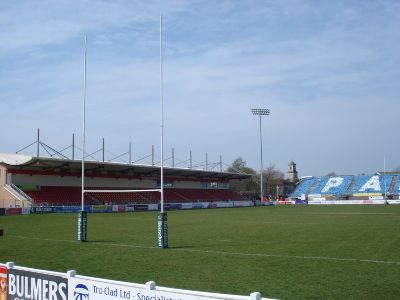
Plymouth trivia
Earliest evidence of settlement in Plymouth dates to the Bronze Age at Mount Batten. This settlement continued as a trading post for the Roman Empire, until it was surpassed by the more prosperous village of Sutton founded in the ninth century, now called Plymouth. Throughout the Industrial Revolution, Plymouth grew as a commercial shipping port, handling imports and passengers from the Americas, and exporting local minerals.
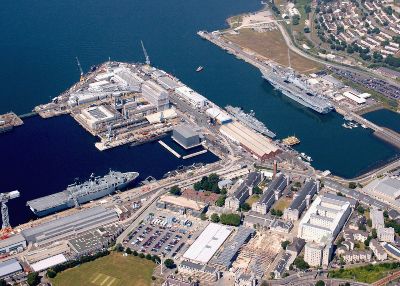
During World War II, due to the city’s naval importance, the German military targeted and partially destroyed the city by bombing, an act known as the Plymouth Blitz. After the war, the city centre was completely rebuilt.
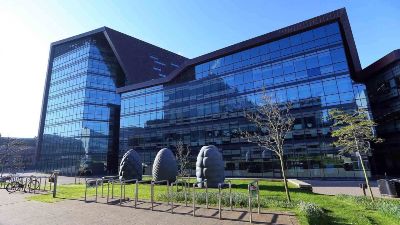
PRINCE2 Agile FAQs
PRINCE2 Agile helps facilitate lean-agile product development without sacrificing the reliability offered by traditional project management.
PRINCE2 Agile allows you to focus on management and product delivery with a suite of agile tools designed to help you manage and react to changing requirements.
PRINCE2 Agile has been developed in collaboration with veteran agile practitioners around the world. It works with all establish Agile approaches and agile tools, allowing easy integration into existing agile project management frameworks.
PRINCE2 Agile provides training and guidance highly focused on the agile environment. Earning your PRINCE2 Agile certification will teach you how project managers can remain a relevant and important part of agile product development and how a project manager can collaborate with staff in standard agile roles.
AXELOS calls PRINCE2 Agile "the world's most complete agile project management solution."
Based on the ideas first outlined in the Agile Manifesto, PRINCE2 Agile project management was developed in response to the changing nature of project management practices, new technologies, and new ways of thinking.
PRINCE2 Agile allows project managers to easily integrate Agile practices, tools and ways of working into existing project management frameworks without costly revisions to project lifecycles without the need to launch enterprise-wide change initiatives.
PRINCE2 Agile can also benefit agile managers who desire the reliability, governance, and oversight of the PRINCE2 method in complex projects.
Candidates who enrol in a PRINCE2 Agile Foundation course will learn how modern concepts aid the management of successful projects. Topics include the use of MoSCoW prioritisation, Kanban, Scrum and other tools, as well as unique agile roles such as the Scrum Master and Scrum Product Owner.
Candidates who attend PRINCE2 Agile Practitioner training will learn to seamlessly integrate agile practices with PRINCE2 governance and controls in agile environments.
PRINCE2 is a customer-focused project management methodology. It offers a set of principles, themes, and processes that helps organisations weigh the costs and risks of initiating a project. It helps the ongoing management of projects to ensure they remain a worthwhile investment.
Agile approaches do not focus on the value or management of a project as a whole. Instead, they focus on the development level, ensuring that any given product or service is delivered in the most efficient manner possible through an iterative cycle of development, testing, and analysing customer feedback.
While PRINCE2 enables the customer to remain focused on the project’s original business goals, Agile approaches are very responsive to changes in the project environment and customer requirements.
Utilising Agile approaches on PRINCE2 projects allows project managers to combine the structure and governance of PRINCE2 with the flexibility and responsiveness of Agile. PRINCE2 Agile training helps PRINCE2 project managers adapt their practices in agile ways.
Yes. Despite the common misconception that PRINCE2 struggles to adjust to changing business requirements, the PRINCE2 framework is, in fact, easy to adapt and tailor to suit any project environment.
PRINCE2 is sometimes described as having a prescriptive ‘waterfall’ approach, whereby requirements are documented and approved before moving to the design, build, and testing phase. This is, however, incorrect. PRINCE2 assumes that on many projects, requirements emerge and evolve as the project continues.
PRINCE2 manages project-level changes using its ‘change control’ approach. Smaller changes at the development level can easily be managed using the prioritisation techniques common in Agile approaches.
PRINCE2 Agile elaborates on the tools team leaders, and project managers can use at the development level to facilitate faster autonomous development.
It’s not accurate to compare PRINCE2 and Agile as equivalent project management solutions. For one, agile has nothing to do with project management. Instead, it focuses squarely on issues encountered by individuals and small teams at the development level.
PRINCE2, on the other hand, is generally more concerned with the ‘big questions’ like “Should we do this project?” “How do we avoid risks and failure” or “How can we be sure that 6 months from now this product will still be desirable?”
PRINCE2 and Agile are not competing methods. PRINCE2 Agile was developed specifically to show that they are complementary approaches to different problems.